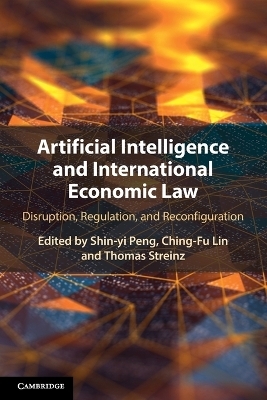
Artificial Intelligence and International Economic Law
Cambridge University Press (Verlag)
978-1-108-94906-4 (ISBN)
Artificial intelligence (AI) technologies are transforming economies, societies, and geopolitics. Enabled by the exponential increase of data that is collected, transmitted, and processed transnationally, these changes have important implications for international economic law (IEL). This volume examines the dynamic interplay between AI and IEL by addressing an array of critical new questions, including: How to conceptualize, categorize, and analyze AI for purposes of IEL? How is AI affecting established concepts and rubrics of IEL? Is there a need to reconfigure IEL, and if so, how? Contributors also respond to other cross-cutting issues, including digital inequality, data protection, algorithms and ethics, the regulation of AI-use cases (autonomous vehicles), and systemic shifts in e-commerce (digital trade) and industrial production (fourth industrial revolution). This title is also available as Open Access on Cambridge Core.
Shin-yi Peng is Distinguished Professor of Law at National Tsing Hua University. She is a former Commissioner of the National Communications Commission of Taiwan and has served as Vice President of the Society of International Economic Law. Professor Peng is also a member of the Indicative List of Panelists for resolving WTO disputes. Ching-Fu Lin is Associate Professor at National Tsing Hua University, where he teaches artificial intelligence law and policy, international law and global governance, and law and technology. Thomas Streinz is Adjunct Professor of Law and Executive Director, Guarini Global Law and Tech at NYU School of Law. He co-convenes the Guarini Colloquium: Regulating Global Digital Corporations and co-teaches a course on Global Data Law. He is also an editor of Megaregulation Contested: Global Economic Ordering After TPP.
Preface; 1. Artificial intelligence and international economic law: disruption, regulation, and reconfiguration Shin-Yi Peng, Ching-Fu Lin and Thomas Streinz; Part I. Systemic Shifts in the Global Economic Order: 2. Trade law in a data-driven economy: a call for modesty and resilience Gregory Shaffer; 3. Global law in the face of datafication and artificial intelligence Rolf H. Weber; 4. Trading AI: economic interests, societal choices and multilateral rules Dan Ciuriak and Vlada Rodionova; Part II. Reconceptualizing WTO Law for the Ai Economy: 5. Trade rules for industry 4.0: why the TBT agreement matters even more Aik Hoe Lim; 6. Autonomous vehicle standards under the TBT agreement: disrupting the boundaries? Shin-Yi Peng; 7. Convergence, complexity and uncertainty: AI and intellectual property protection Bryan Mercurio and Ronald Yu; 8. Are digital trade disputes 'trade disputes'? Yuka Fukunaga; Part III. Data Regulation as AI Regulation: 9. International economic law's regulation of data as a resource for the AI economy Thomas Streinz; 10. Data protection and artificial intelligence: the EU's internal approach and its promotion through trade agreements Alan Hervé; 11. Data portability in a data-driven world Frederike Zufall and Raphael Zingg; Part IV. International Economic Law Limits to AI Regulation: 12. Public moral, trade secret, and the dilemma of regulating driving automation systems Ching-Fu Lin; 13. International trade law and the data ethics: possibilities and challenges Neha Mishra; 14. Disciplining artificial intelligence policies: WTO law as a sword and a shield Kelly K. Shang and Rachel R. Du; V. Reconfiguration of International Economic Law: 15. Across the great wall: e-commerce joint statement initiative negotiation and China Henry Gao; 16. The next great global knowledge infrastructure land rush has begun: will the US or China prevail? Jane K. Winn and Yi-Shyuan Chiang; 17. Trade law architecture after the fourth industrial revolution Lisa Toohey.
| Erscheinungsdatum | 06.04.2024 |
|---|---|
| Zusatzinfo | Worked examples or Exercises |
| Verlagsort | Cambridge |
| Sprache | englisch |
| Maße | 152 x 229 mm |
| Gewicht | 529 g |
| Themenwelt | Informatik ► Theorie / Studium ► Künstliche Intelligenz / Robotik |
| Recht / Steuern ► EU / Internationales Recht | |
| ISBN-10 | 1-108-94906-1 / 1108949061 |
| ISBN-13 | 978-1-108-94906-4 / 9781108949064 |
| Zustand | Neuware |
| Informationen gemäß Produktsicherheitsverordnung (GPSR) | |
| Haben Sie eine Frage zum Produkt? |
aus dem Bereich


